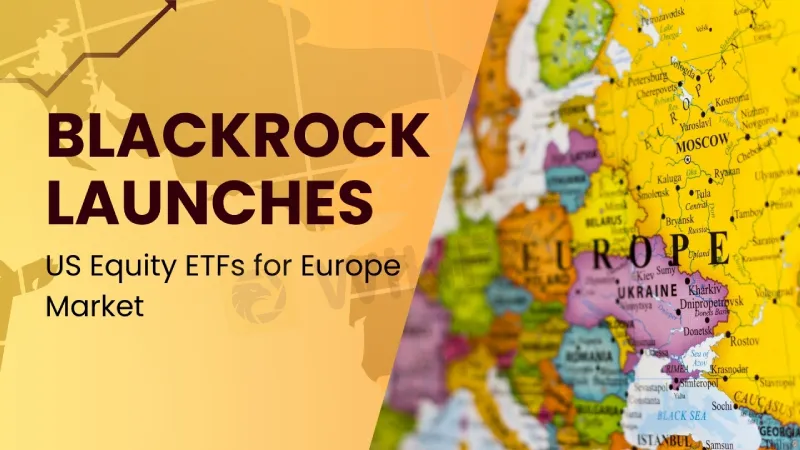简体中文
繁體中文
English
Pусский
日本語
ภาษาไทย
Tiếng Việt
Bahasa Indonesia
Español
हिन्दी
Filippiiniläinen
Français
Deutsch
Português
Türkçe
한국어
العربية
BlackRock Launches US Equity ETFs for Europe Market
Abstract:BlackRock launches two new US equity ETFs in Europe, offering cost-effective synthetic exposure to small-cap and large-cap growth segments through swaps-based structures.

BlackRock Inc., the world's biggest ETF producer, has launched two US equities ETFs in Europe. Using swap-based designs, these ETFs provide exposure to the small- and large-cap growth divisions in the United States. These ETFs, which are listed on the London Stock Exchange, cater to European investors' rising interest in US stocks.
The iShares Russell 2000 Swap UCITS ETF for Small-Cap Growth
The iShares Russell 2000 Swap UCITS ETF (RU2K) aims to replicate the Russell 2000 index, which contains 2,000 small-cap US firms. RU2K leverages total return swaps to get exposure to the small-cap growth market. It appeals to European investors searching for diverse U.S. shares, particularly following the small-cap rise in July.
RU2K provides synthetic exposure, which means it does not directly own equities but instead mimics the Russell 2000 index using derivatives. Its 0.2% fee ratio makes it a reasonable choice for those looking for small-cap companies in the United States.
UCITS ETF iShares Nasdaq 100 Swap for Large-Cap Growth
The iShares Nasdaq 100 Swap UCITS ETF (N100) follows the Nasdaq 100 index, which includes 100 big non-financial businesses. N100 focuses on technology businesses and gives exposure to large-cap growth, which will be a significant contributor to US market performance in 2024.
Because of its simple access to large-cap growing firms, N100 benefits both institutional and individual investors in Europe. With an expense ratio of 0.2%, it complements current US equity exposure and appeals to investors seeking synthetic exposure to this solid section of the US market.

The Advantages and Disadvantages of Swap-Based ETFs
Swap-based ETFs such as RU2K and N100 give European investors a unique opportunity to get exposure to US stocks. These synthetic ETFs duplicate index performance using total return swaps to avoid dividend withholding taxes. This tax-efficient framework, which is backed by the 2017 HIRE Act, appeals to European investors.
These ETFs, however, are not without their hazards. The synthetic structure creates counterparty risk since the ETF's success is dependent on swap suppliers satisfying their promises. BlackRock mitigates this risk by using a multi-swap counterparty strategy, which reduces reliance on a single counterparty while still maintaining the integrity of the collateral involved.
BlackRock's ETF Lineup Expands
BlackRock's synthetic ETF offerings in Europe continue to grow with the introductions of RU2K and N100. The iShares MSCI World Swap UCITS ETF (IWDS) was introduced by the business in March to provide worldwide market exposure. The growth in US market indexes such as the S&P 500, Nasdaq Composite, and Russell 2000 in 2024 has raised demand for ETFs such as RU2K and N100.
Swaps-based ETFs are becoming more popular among European asset managers and institutional investors seeking U.S. stock exposure. BlackRock's transition from selling just physical ETFs to incorporating synthetic alternatives coincides with European investors' changing demands.
Future Outlook for Equity ETFs from the United States in Europe
BlackRock's emphasis on U.S. equities ETFs demonstrates the company's dedication to providing flexible investing alternatives. BlackRock seeks to fulfill the demands of institutional and individual investors by introducing swaps-based ETFs following prominent US indexes such as the Russell 2000 and Nasdaq 100.
BlackRock has five synthetic ETFs in its portfolio, making it a key participant in the European synthetic ETF market. This move reflects a rethinking of synthetic structures as well as a reaction to European investors' increased need for tax-advantaged access to US equities markets.
Get the latest on BlackRock's new US equity ETFs. Visit WikiFX News for full details on how these swaps-based funds are impacting European investors.

Disclaimer:
The views in this article only represent the author's personal views, and do not constitute investment advice on this platform. This platform does not guarantee the accuracy, completeness and timeliness of the information in the article, and will not be liable for any loss caused by the use of or reliance on the information in the article.
Read more

South Korean Regulator Blocks Access to 17 Unreported Offshore VASP Apps on Google Play
South Korea’s Financial Intelligence Unit (FIU) has blocked access to 17 unreported offshore VASP apps on Google Play to protect domestic users from potential financial risks.

GameStop Adds BTC to Reserves and Plans to Raise $1.3 Billion to Purchase Bitcoin
GameStop announced plans to raise $1.3 billion through convertible notes to purchase Bitcoin as part of its treasury reserves. The company aims to enhance liquidity and manage financial obligations with digital assets.

How Cyberattacks Cost BSP-Overseen Institutions P5.82 Billion in 2024
Cybersecurity risks cost BSP banks P5.82B in 2024. Phishing and AI-driven attacks surge as digitalization widens vulnerabilities. Explore the rising cyber threat impact.

Bank Central Asia Addresses Cryptocurrency Scam Claims
Bank Central Asia responds to a cryptocurrency scam using its accounts, targeting investors via social media. Learn about the scam and BCA’s stance.
WikiFX Broker
Latest News
Enlighten Securities Penalized $5 Million as SFC Uncovers Risk Control Failures
Why Are Financial Firms Adopting Stablecoins to Enhance Services and Stability?
Experienced Forex Traders Usually Do This Before Making a Lot of Money
Octa vs XM:Face-Off: A Detailed Comparison
When High Returns Go Wrong: How a Finance Manager Lost RM364,000
Bridging Trust, Exploring Best—WikiEXPO Hong Kong 2025 Wraps Up Spectacularly
Unlocking the Power of Algo Trading: Benefits and Limitation
Rise of Fake Trading Apps & Their Impact on Investors
Crypto-to-Cash Transfers Now Available for UK and Europe
U.S. and Japan Interest Rates Hit Recent Highs – Watch Out for Short Sellers
Currency Calculator







